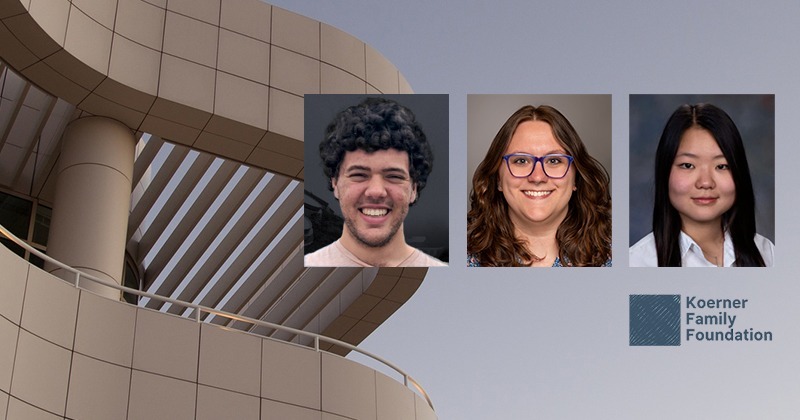University of Delaware Ph.D. candidates Cameron Ibrahim, Lottie Murray, and Juliana Nam were each awarded a graduate fellowship from the Koerner Family Foundation, an organization dedicated to training and retaining U.S. engineers. These students are among just seven UD recipients of this recognition.
Ibrahim, who earned a bachelor’s degree in computer science from Cornell University, is pursuing a Ph.D. in computer science. His research, under the supervision of associate professor Ilya Safro, focuses on graph optimization problems which can be conceptualized as ordering problems. Many difficult optimization problems are more manageable when the variables are ordered effectively. Ibrahim’s work aims to identify optimal orderings to improve performance and solution quality.
“I’ve found working with graph optimization not only to be personally fulfilling, but also impactful to academia at large,” said Ibrahim. “I was ecstatic to be chosen [for this fellowship], it’s really quite an honor to be recognized for my work.”
Murray received a bachelor’s degree in physics from Washington & Jefferson College, which allowed her to pursue a Ph.D. in materials science and engineering.
Murray’s doctoral research, supervised by professor Matthew Doty, focuses on utilizing 2D materials, specifically gallium selenide (Ga2Se2) for quantum technology applications. Her goal is to understand the material’s stability for quantum use, and to explore how strain engineering can produce quantum emitters.
“It was really exciting to share the news with my family and celebrate together,” said Murray. “I am extremely grateful to represent my department, and thankful to everyone who has supported me at both UD and the Koerner Family Foundation.”
Nam received a bachelor’s degree in chemical engineering from Cornell University and is furthering her studies at UD with a Ph.D. in chemical engineering.
Under the supervision of assistant professor Alexandra Bayles, Nam’s research involves using machine learning to optimize the design and output of 3D printing “advective assembly” nozzles that sculpt multi-material, living inks before depositing composite filaments on a print bed. The methods Nam is developing will allow 3D printing users to design complex structures without time-intensive computational fluid dynamics, and reveal new classes of realizable architectures.
“I have always enjoyed coding and learning new techniques to solve engineering problems,” said Nam. “My initial reaction to receiving this fellowship was shock, followed by gratitude for my advisor, lab mates, and everyone who supported me during my time at graduate school.”
About the award
The Koerner Family Foundation graduate fellowships enable students to complete their doctoral degrees in engineering research so that these scholars may go on to use their education to create innovative solutions to some of the nation’s most difficult problems. Fellowship recipients must be United States citizens, have passed their candidacy exams for their doctoral degree and express an interest in a research career.
Article by Article by Kathryn Trupia | Illustration by Joy Smoker (featured on COE News, 01/31/25)

